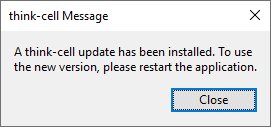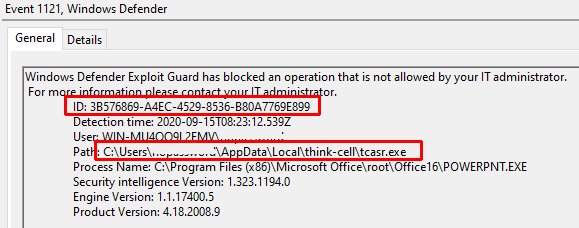Conflict with Windows Defender: think-cell does not load or the internal datasheet does not open
Problem 1
After a Windows update, think-cell suddenly no longer loads. Trying to activate think-cell in the PowerPoint options menu has no effect.
Problem 2
After a Windows update, I am unable to open the internal datasheet of think-cell. When I insert a new think-cell chart or double-click an existing think-cell chart, I see the following message:

I already restarted my PC, but the problem continues to occur. Trying to open an email using think-cell's Send Slides... or Request Support... feature fails with a similar message.
For detailed analysis steps, click on
Analysis
- Is think-cell installed in the user account, e.g.,
C:\Users\[your_username]\AppData\Local\think-cell? You can find your think-cell install directory in PowerPoint: File > Options > Add-Ins in column Location -
If yes, open the Windows Event Viewer and go to the following path:
Application and Services Logs > Microsoft > Windows > Windows Defender > Operational
Go to Actions > Find... and search for
think-cell. If you find a Warning, select it and check if the General tab shows think-cell's installation path and the ID: 3B576869-A4EC-4529-8536-B80A7769E899, e.g.:
- The problem occurs with Windows Defender security intelligence version between 1.353.694.0 and 1.355.1377.0 when the following Windows Defender ASR rules are set.
Cause
If you are using Windows Defender security intelligence version lower than 1.355.1377.0 and the following two Windows Defender ASR rules are set, the execution of either think-cell's tcaddin.dll or tcasr.exe is blocked and the file is deleted:
3B576869-A4EC-4529-8536-B80A7769E899
(Block Office applications from creating executable content)c1db55ab-c21a-4637-bb3f-a12568109d35
(Use advanced protection against ransomware)
If the tcaddin.dll is missing, think-cell cannot load (Problem 1). If the tcasr.exe is missing, opening the internal datasheet does not work anymore and sending an email via Send Slides… or Request Support… fails with an error message (Problem 2).
Solution
To fix the issue:
- Install the latest Windows Defender security intelligence update, e.g., Windows Start > Settings > Update & Security > Windows Security > Virus & threat protection > Virus & threat protection updates > Check for updates
- Reinstall think-cell to restore missing files.
The problem was fixed by Microsoft. It does not occur with the security intelligence version 1.355.1377.0 or later. To verify your security intelligence version, go to Windows Start > Settings > Update & Security > Windows Security > Virus & threat protection > Settings > About. The latest security intelligence update is available for download on Microsoft's website.
Workaround
If you cannot install the Windows Defender security intelligence update, you can alternatively uninstall your existing think-cell installation and reinstall it as administrator. The problem does not occur with per-machine installations.
Contact support
In case think-cell is installed as administrator or if you cannot find the Warning in the Event Viewer, Windows Defender is not causing the issue to occur. In this case, or if you are still experiencing issues after installing the latest security intelligence update, please contact our support team:
Please send us your think-cell log files for analysis. Since Request Support… does most likely not work, you can find the logs as explained below:
-
Open a new Windows Explorer window.
-
Type in
%LOCALAPPDATA%\think-cellinto the address field, and press Enter -
Please send all files with the extension
.logcontained in this folder to our support team. These files may include any of the following:POWERPNT_log.log,EXCEL_log.log,TCMAIL_log.log,TCUPDATE_log.log,TCRUNXL_log.log,TCASR_log.log,PPTTC_log.log,setup_think-cell_xxxxx_log.log. -
If you want to browse to the directory:
The full default filepath is
C:\Users\USERNAME\AppData\Local\think-cell. ReplaceUSERNAMEwith your username.If you cannot find this folder, it is probably set to invisible. You can change that in Windows Explorer by checking:
- Windows 7:
Organize → Folder and search options → View → Show hidden files and folders. - Windows 8, Windows 8.1 and Windows 10:
View → Show/hide → Hidden Items.
In addition, if think-cell is active, please click on Tools

- Windows 7: